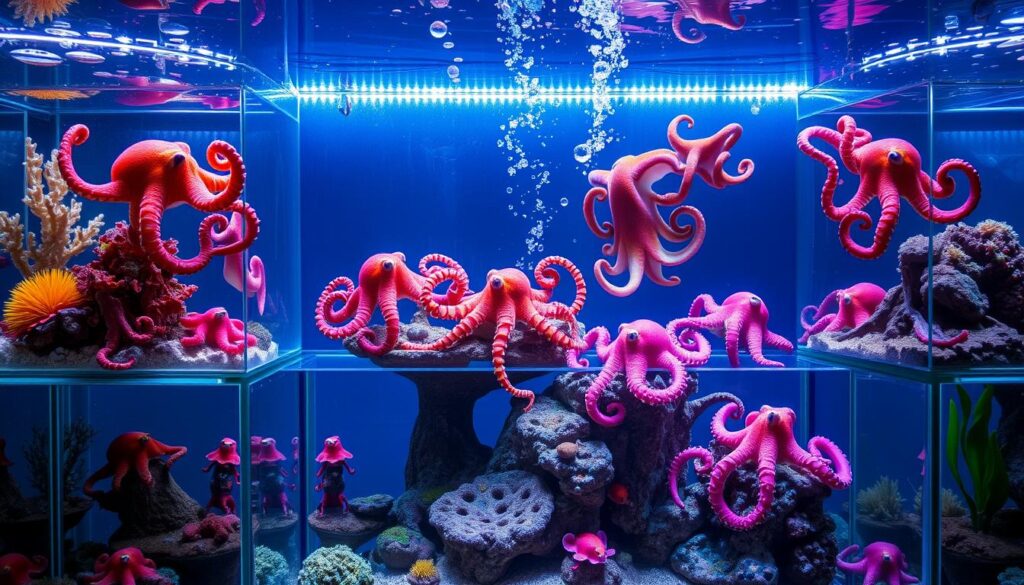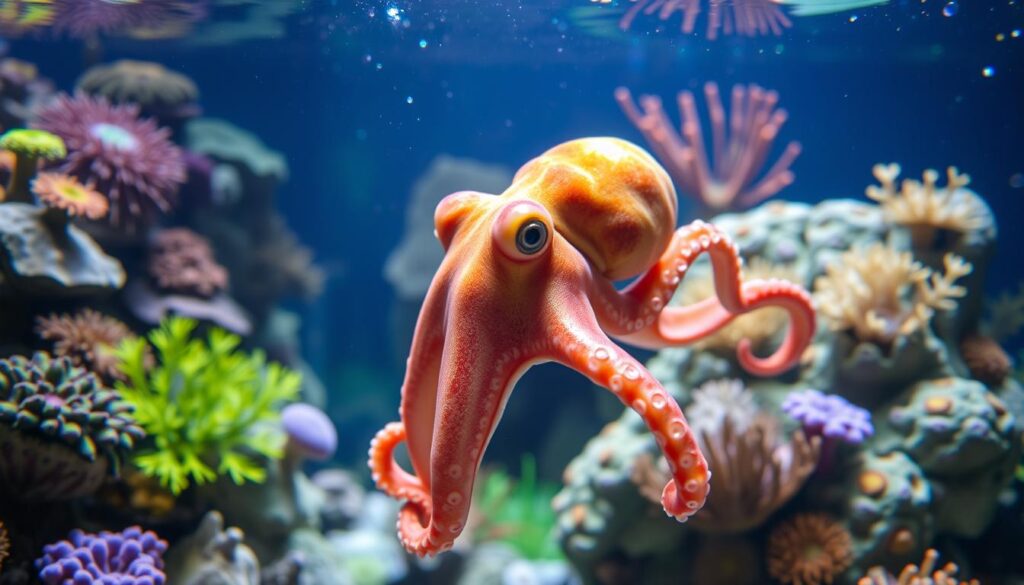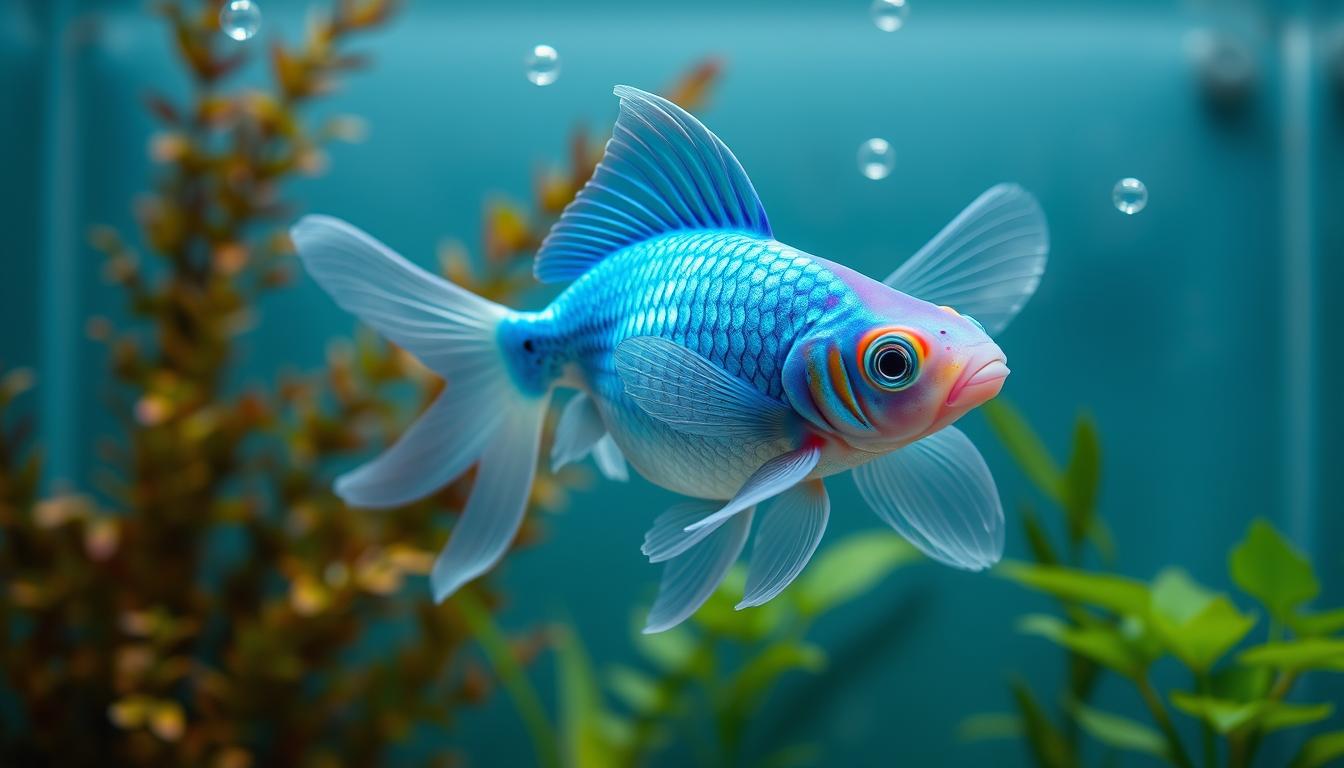Pet Octopus for Sale: Find Your Perfect Cephalopod

A vibrant underwater scene showcasing a variety of colorful pet octopuses in glass aquariums, surrounded by marine decorations like coral and sea plants, soft lighting illuminating the tanks, and playful bubbles rising to the surface.
Did you know most octopuses live only six months to two years? This fact shows how special a pet octopus can be for your exotic pets collection1. They are known for their bright colors, smartness, and complex behaviors. But, they need special care and homes, unlike regular pet fish2.
The Blue-Ringed Octopus costs about \$209.99, and the Caribbean Octopus ranges from \$139.99 to \$229.991. If you’re thinking about getting a pet octopus, do your homework first. This way, you and your new pet will be happy and healthy for their short lives.
Key Takeaways
- Most octopuses live between six months to two years, making lifespan an essential consideration.
- Pet octopuses exhibit unique behaviors and intriguing intelligence.
- Understanding their specific care needs is crucial before making a purchase.
- Common pet octopus prices range from \$139.99 to \$229.99, depending on the species.
- Research is key to creating a suitable habitat for your octopus.
Understanding the Appeal of Pet Octopuses
Choosing an octopus as a pet is more than just about looks. It’s about their unique characteristics and interesting behaviors. These creatures are known for their amazing ability to change color and texture. This makes them stand out to those interested in owning one.
Unique Characteristics of Octopuses
Octopuses have features that make them special. They have the biggest brain-to-body size ratio among invertebrates, showing they are smart and can learn. For example, a Giant Pacific Octopus can be as heavy as 110 pounds, with some reaching 156 pounds. Their arms can stretch up to 16 feet long3.
They have three hearts and blue blood, perfect for life underwater. This helps them survive and adapt better.
Intelligence and Interactivity
The octopus intelligence is unmatched among invertebrates. They solve problems, like opening jars, and use tools, showing their smarts. These creatures need mental challenges or they might get stressed and start doing repetitive things4.
They can remember their tanks and the people who take care of them. This shows they can form bonds with others.
Species Variations: Which Octopus is Right for You?
Choosing the right octopus species is key. Not all are good pets because they have different needs and behaviors. For example, the Caribbean Octopus is calm and good for beginners. But, the Hawaiian Day Octopus is endangered and shouldn’t be kept as a pet4.
Knowing about the different species will help you pick the best pet octopus.
| Species | Average Weight | Arm Length | Behavior |
|---|---|---|---|
| Giant Pacific Octopus | 22-110 lbs (up to 156 lbs) | Up to 16 feet | Intelligent, curious, can exhibit problem-solving skills |
| Caribbean Octopus | 2-5 lbs | Up to 2.5 feet | Docile, suitable for beginners |
| Blue-Ringed Octopus | 1-2 lbs | Up to 12 inches | Venomous, requires expert care |
Where to Buy Your Pet Octopus
Looking for a pet octopus means checking out different places to find a healthy and fitting companion. It’s important to know where to buy octopus for those thinking of getting one. You can find them online or in local fish stores.
Reputable Online Retailers
Online stores have a big selection of octopus species. They give detailed info on care and what to expect. Always look at customer reviews and check the site’s ethics before buying a pet octopus online. These sites can send your new pet right to your home, making buying easy.
Local Fish Stores: Benefits of In-Person Purchases
Going to a local fish store has its perks. You can see the octopus in person to make sure it looks healthy. You can also talk to the staff about how to take care of it and if it will fit in your tank.
For instance, a good store might tell you about the need for a tank of 50-75 gallons or more5. They might also suggest you get stable rocks and a sealed lid5. Talking to the sellers helps you understand their ethics, helping you make a good choice.
Buying Considerations for a Pet Octopus
Thinking about getting a pet octopus? You’ll need to consider both the initial costs and the ongoing expenses for care. The price of an octopus can range from $20 to $1,000, depending on the type and where you get it6. You also need to think about the cost of setting up an aquarium, which should be at least 55 gallons6. Some experts even suggest a 70-gallon tank for a softball-sized octopus6.
Don’t forget to budget for food, upkeep, and any special equipment for your octopus’s home. These costs add up quickly.
Initial Investment: Upfront Costs and Ongoing Expenses
Buying an octopus means more than just the cost of the pet itself. You’ll also need to set up an aquarium. You’ll spend money on food, like crustaceans, which include crabs, lobsters, and shrimps7. Make sure you have enough money for all the supplies you need, as octopuses are very sensitive to water quality8.
Understanding Species Compatibility with Your Aquarium
It’s also key to know which octopus species will get along in your aquarium. Octopuses like to be alone and might eat other sea creatures7. Most octopus species can’t live with other sea animals well. Make sure your aquarium meets an octopus’s needs and is safe to prevent escape, as they are very good at finding ways out6.
Buy Pet Octopus: What to Look For
When you decide to buy a pet octopus, it’s important to check for health and ethical sourcing. Healthy octopuses have clear eyes, bright colors, and active behavior. Make sure the seller follows ethical standards to avoid harming the environment.
Health Indicators in Octopuses
Observing health indicators in octopuses is key to a good pet experience. These signs include their looks and how active they are. A healthy two-spot octopus is lively, showing it’s well cared for. They can lay 40 to 60 eggs, which means they’re likely to breed well in captivity9.
Keeping half of the baby octopuses alive after 60 days shows they’re raised in good conditions9.
Ensuring Ethical Sourcing
Buying an octopus from ethical sources helps protect the environment and the species. Octopuses live from six months to two years, with some species living longer7. They eat mainly crustaceans, so knowing where your octopus comes from is important for ethical care7. Make sure the seller doesn’t harm octopus populations or their homes.
Setting Up Your Aquarium for an Octopus
Setting up the right aquarium for your octopus is key to its health and happiness. The tank size and the right equipment are crucial for a comfy home. Here are some tips to help you set up your aquarium well.
Recommended Tank Size and Setup Requirements
The size of the tank depends on the octopus species you have. For example, Octopus mercatoris does well in a 30-gallon tank. On the other hand, Octopus briareus needs a bigger space, around 50 to 75 gallons, and a temperature of 78°F. Octopuses also need a lot of live rock and a deep sand bed to feel at home10.
Essential Equipment: Filters, Heaters, and More
For an octopus aquarium, you’ll need certain key items. A good filter is a must because octopuses have fast metabolisms. Use a wet-dry filter, a protein skimmer, and keep an eye on the water quality. This means a pH of 8.2, no ammonia or nitrite, and a specific gravity of 1.02611.
Also, make sure your tank has a strong lid to stop your octopus from escaping. And, make sure the filter and heater are secure to protect your octopus.
Octopus Care: Essential Guidelines

A serene underwater scene featuring a vibrant, healthy octopus in a beautifully decorated aquarium, surrounded by colorful corals and plants, with gentle lighting illuminating the water, showcasing an ideal habitat for cephalopods, emphasizing water quality and enrichment items like toys and hiding spots.
Proper care is key for octopuses to live long and healthy lives. Focus on water quality and diet, which are crucial for their health.
Water Quality: Maintaining Optimal Conditions
Keeping the water perfect is vital for your octopus. Test it often for pH, ammonia, and nitrate levels. This keeps their home safe and healthy12. Octopuses live about 1-2 years in tanks, so good water is a must12.
They can live in various water conditions, but the best is usually around pH 8.412. These smart creatures can slip out of tanks easily, so a secure tank is also key12.
Feeding Your Octopus: Dietary Needs and Preferences
Octopuses need specific foods to stay healthy. Feed them live foods like crabs, shrimp, and snails13. A balanced diet supports their fast metabolism, which is faster than many other animals12.
Adding toys for playtime is also good for them. Toys like ping-pong balls or Legos keep them active and happy13. Knowing these care tips will make owning an octopus rewarding.
Common Challenges in Octopus Care
Caring for a pet octopus comes with its own set of challenges. Knowing what these challenges are helps you give your cephalopod the best care possible.
Behavioral Issues: Understanding Their Nature
Octopuses are smart and show complex behaviors. They might act out due to boredom, stress, or being in a small space. Many octopuses get destructive if they’re not kept busy, and they love to change their home. Since they sleep during the day, they’re mostly awake at night, making their care harder12.
It’s key to give your octopus a rich environment to live in. This means having places to hide, toys, and chances to hunt. These things help keep them happy and healthy.
Preventing Escape: Secure Aquarium Modifications
Octopuses are great at escaping, so you need to stop them. They can open lids and find holes in tanks. To stop them, use deep tanks or cover the top with Astro-Turf12. Make sure the tank is secure and check for any gaps to keep your octopus safe.
Having a well-kept tank with stable decorations is important for their safety and happiness. There have been many cases where octopuses have escaped if their tanks weren’t secure12.
| Challenge | Considerations |
|---|---|
| Behavioral Issues | Provide enrichment and varied habitats |
| Preventing Escape | Ensure secure aquarium modifications |
| Diet | Feed a varied diet comprising live prey |
| Water Quality | Maintain optimal pH and ammonia levels |
By tackling these challenges and understanding octopus behavior, you can make a better life for your pet. You’ll also create a safe and interesting place for them.
Socializing with Your Pet Octopus

A vibrant underwater scene featuring a playful pet octopus interacting with colorful coral and marine life, showcasing its curious nature as it explores, with gentle bubbles rising around it, and soft sunlight filtering through the water above.
Building a bond with your pet octopus requires patience and understanding their social ways. Social activities help build trust and improve your pet’s happiness. You can encourage interaction with gentle handling and fun experiences, making your octopus feel safe.
Building Trust and Interaction
Octopuses are usually alone but can connect with humans. Regular chats help build trust, showing your octopus through color changes and moves. Studies show octopuses are curious and can engage with new things14. Over 7 hours of footage showed octopuses often touched each other, showing they like to be close15.
Signs of a Happy and Healthy Octopus
Look for signs of a happy octopus in its actions and looks. A happy octopus has bright colors and moves a lot. Studies found octopuses change color often, showing their feelings15. Seeing them explore and eat well are also good signs.
Make sure your octopus has a fun place to live to keep it happy and healthy.
Incorporating Octopuses into Your Exotic Pet Collection
Adding an octopus to your exotic pets can make your collection more interesting. It brings beauty and requires special care. You need to think about daily care and making sure their home is right for them.
Managing an Exotic Pet Household
Looking after exotic pets needs careful planning and knowing about each species. Octopuses are smart and can act like people16. They need a big tank to live in, or they might get stressed and sick16. It’s important to spend time with them to build a strong bond.
Legal Considerations for Ownership
Before getting an octopus, check the legal rules about owning them. Some places have laws about keeping octopuses and other exotic pets17. In fact, 81% of vets worry about the welfare of exotic pets17. Knowing the laws helps you take good care of your pet and keeps them happy and healthy.
Conclusion
Buying a pet octopus is an exciting step into the exotic pet world. It comes with its own set of challenges and rewards. Over the past five years, sales have jumped by 300%, showing more people want these unique pets18. But, it’s key to know what you’re getting into. You need to understand the different species, what kind of tank they need, and how to care for them.
Creating a home for your octopus means providing the right environment. This includes dim lighting and a tank that won’t let them escape. Keeping the water clean is also vital, with weekly water changes of about 10%18. It’s also important to keep their minds active with fun activities. This helps them stay happy and healthy.
Before diving into cephalopod pet ownership, make sure you’re ready for the commitment. With the right research and setup, you can have a rewarding relationship with your octopus19. Picking the right species for your lifestyle is crucial for a happy pet and owner18.
FAQ
What types of octopuses are available for pets?
You can find the Blue-Ringed Octopus and the Caribbean Octopus as pets. Each species has different needs and sizes. It’s key to pick the right one for your space.
How much does a pet octopus cost?
A Blue-Ringed Octopus starts at $209.99. Caribbean Octopuses cost between $139.99 and $229.99. Prices vary by size and availability.
Where can I buy a pet octopus?
You can buy a pet octopus from trusted online shops or local fish stores. Buying in person lets you see the animals and ask about their care.
What should I look for when buying a pet octopus?
Check for clear eyes, bright colors, and lively behavior to see if the octopus is healthy. Make sure the seller sources their octopuses ethically.
What kind of setup does an octopus need?
Your octopus needs a 50-75 gallon tank with live rock, sand, and certain equipment. This includes a wet-dry sump filter and a protein skimmer.
What dietary needs do pet octopuses have?
Octopuses eat live foods like shrimp, crabs, and small fish. Adding dry foods can also be good for them.
How can I ensure the water quality for my octopus?
Keep the water clean by testing for pH, ammonia, and nitrate levels. Aim for a pH of 8.2, zero ammonia, and a specific gravity of about 1.026.
Can I keep other fish with my pet octopus?
Many octopus species prefer to be alone because they are predators. Think carefully about who you can keep with your octopus in the tank.
What are some common challenges in octopus care?
Octopus care can face challenges like boredom leading to destructive behavior. It’s also important to secure the tank to stop them from escaping. Octopuses are smart and can solve problems.
How can I build a relationship with my pet octopus?
Gain trust by handling your octopus gently and providing fun activities. Look for signs they’re happy, like color changes and exploring.
Are there any legal considerations for owning an octopus?
Yes, check local laws about having exotic pets. Some places have rules about octopus ownership.
Source Links
- Octopus Tank setup – https://forums.saltwaterfish.com/threads/octopus-tank-setup.394705/
- Octopus Aquariums Ultimate Guide – Custom Aquariums – https://www.customaquariums.com/guides/octopus-aquariums/
- Giant Pacific Octopus Species Profile, Alaska Department of Fish and Game – https://www.adfg.alaska.gov/index.cfm?adfg=giantpacificoctopus.printerfriendly
- A Deep Dive into the Human Threats Facing Octopuses – https://www.freedomforanimals.org.uk/blog/world-octopus-day-2023
- Saltwater Aquarium Inverts for Marine Reef Aquariums: Octopus, Caribbean – https://www.aquariumcreationsonline.net/cephalopods.html
- Does an Octopus Make a Good Pet? – https://www.treehugger.com/does-an-octopus-make-a-good-pet-4864245
- Things to Know Before Buying an Octopus | TFH Magazine – https://www.tfhmagazine.com/articles/saltwater/octopuses-things-to-know-before-you-buy-full-article
- Choosing and Keeping a Pet Octopus | TFH Magazine – https://www.tfhmagazine.com/articles/saltwater/choosing-and-keeping-an-octopus
- Own a pet Octopus? How about potential 40 ? – https://www.reef2reef.com/threads/own-a-pet-octopus-how-about-potential-40.1048031/
- Starting an Octopus Home Aquarium | Tropical Fish Hobbyist Magazine – https://www.tfhmagazine.com/articles/saltwater/so-you-want-to-keep-an-octopus
- How to Set Up for a Pet Octopus – https://animals.mom.com/set-up-pet-octopus-1717.html
- Caring for an Octopus – https://reefs.com/magazine/aquarium-invertebrates-housing-an-octopus/
- Octopus Care 101 – https://forums.saltwaterfish.com/threads/octopus-care-101.281374/
- Please explain: Can you really make friends with an octopus? – https://lighthouse.mq.edu.au/article/please-explain/october-2020/please-explain-can-you-really-make-friends-with-an-octopus
- Octopuses Are Surprisingly Social — and Confrontational, Scientists Find – https://www.livescience.com/53514-octopuses-lead-social-lives.html
- 5 Weird Exotic Pets You Can Keep: Part 1 – British Pet Insurance – https://britishpetinsurance.co.uk/5-weird-exotic-pets-you-can-keep-in-the-uk-part-1/
- Are the key welfare models effective for exotic pet animals? – Discover Animals – https://link.springer.com/article/10.1007/s44338-024-00013-2
- Your Guide to Buy Pet Octopus Successfully – Pet Octopus – https://octopuspet.com/your-guide-to-buy-pet-octopus-successfully/
- AlgaeBarn is celebrating the octopus! – https://www.algaebarn.com/blog/other/celebrating-the-octopus/



